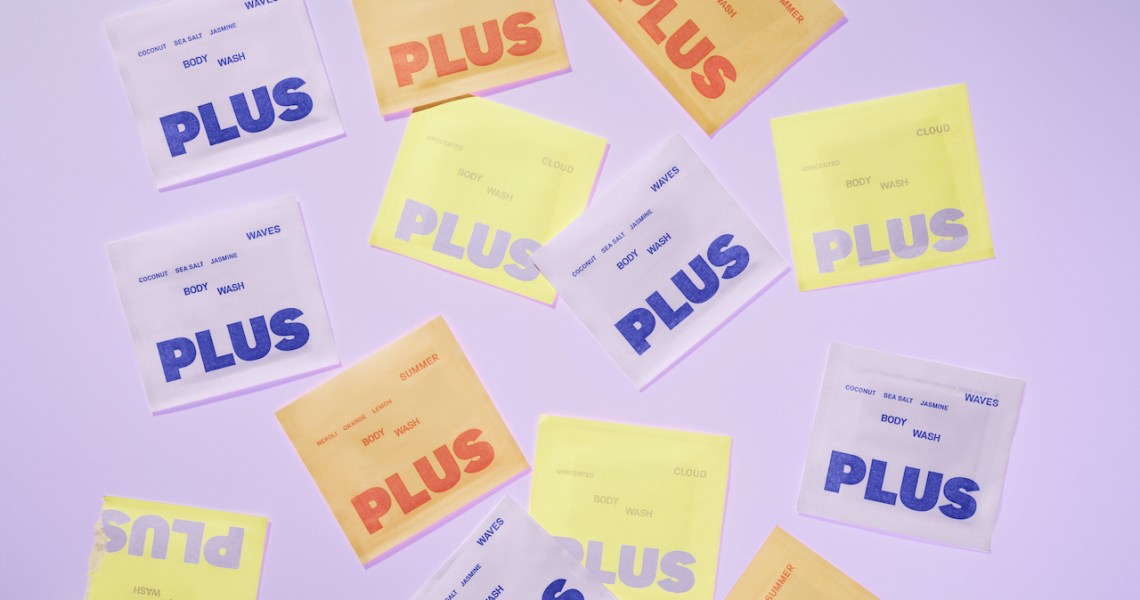As ordering online increasingly becomes the norm, sustainable personal care brand Plus is the latest brand to jump on the waterless trend.
Launched on Tuesday, Plus was created by acne brand Starface co-founders Julie Schott and Brian Bordainick, as well as Cathryn Woodruff, a former marketing director at food startup Banza. Sold exclusively through its DTC site, the brand’s first product is a body wash in sheet form that transforms into a lather when wet. It comes in two different scents and an unscented version. A pack of 16 sheets retails for $16.50. Sachets for the sheets are made of wood pulp and dissolvable ink that can go down the drain.
“We were so surprised to learn that your liquid body wash is literally up to 90% water, with just a tiny percentage of active ingredients,” said Schott. “Essentially, you’re shipping water all over the country, all over the world. The emissions are crazy from that decision alone. It’s just not necessary,” she said.

Plus is the latest brand to hit the market as part of the growing waterless trend that is emerging across personal care, beauty and cleaning products. According to Schott and Bordainick, the brand’s products use 38% less water in manufacturing compared to bottled body wash. And they calculate that the lower shipping weight results in 80% fewer carbon emissions. Dehydrated products are especially catching on among DTC brands as lightweight options can save brands money on shipping costs.
Schott and Bordainick have DTC beauty startup experience from the launch of their Gen Z-focused acne patch brand Starface, in September 2019. It is now stocked at Target. According to Schott, both brands are centered around consumer behavior changes.
With Starface, “prior to launch, there was so much doubt from people we spoke to [about] it. [They thought] nobody would ever want to share their acne or to draw attention to it,” said Schott. But after being popularized by then-emerging TikTok stars including Charli D’Amelio, the products went viral and have become part of a wave of acne patch brands flooding the market. Bordainick said in November that Starface was performing higher than initially expected at Target and was out of stock in 22% of locations.
The marketing plan for Plus’ launch is focused on Instagram and TikTok, as well as “other surprising places,” said Schott.
“The customer is going to be huge in propelling the conversation forward,” said Schott. “It’s a very word-of-mouth behavior change. Once you enjoy it, you tell your friends about it. It’s like refillable water bottles versus bottled water.”

“I really admired how the Starface team had totally changed behavior in the acne category and made acne a moment of self-expression rather than shame,” said Woodruff, the brand’s CEO. She noted that the plan for Plus is to “change behavior in a category that really hasn’t changed in many years.” Investors and industry leaders have also taken notice, as Plus has raised an undisclosed amount of pre-seed capital. It counts Briogeo founder Nancy Twine as an advisor.
Schott, who worked as a beauty editor at Elle before founding Starface, said that she’s seen demand for sustainability rise rapidly in beauty. She noted that, as recent as five years ago, “Nobody was asking, ‘Is this single-use plastic? Is this refillable?'”
While Starface and Plus are separate entities, the same in-house creative team from Starface created the aesthetic for the new brand, which also has a colorful Gen-Z feel. According to Woodruff, the goals for the packaging were to be “earth-friendly” and “calm and inviting,” and to “bring that pop to the body wash space, [to create a] moment of something that’s fun and exciting in your shower.”
While the brand is DTC for now, a retail trajectory similar to Starface’s could be in the future. “The long-term goal would be to make it more accessible in other places,” said Schott.




